Tourism and Society: PESTLE Analysis and Tourist Typologies in the UK
VerifiedAdded on 2023/06/04
|9
|2503
|125
Essay
AI Summary
This essay delves into the intricate relationship between tourism and society, particularly within the context of the UK. It begins by highlighting the economic significance of tourism, emphasizing its contribution to wealth and job creation, while also acknowledging its socio-cultural aspects in fostering peace and intercultural exchange. The essay then explores the UK tourism industry, its economic impact, and the influence of push-pull factors on tourist behavior, including an analysis of popular destinations like the British Museum. It examines the role of stakeholders, including entrepreneurs, local communities, and governments, in shaping the tourism landscape. Furthermore, the essay investigates the positive and negative economic, social, and environmental impacts of tourism, along with a PESTLE analysis of external factors affecting the industry. It concludes by discussing tourist behavior, including decision-making processes, motivations, and typologies, specifically focusing on Cohen's tourist typology to understand diverse tourist profiles and their implications for the industry.
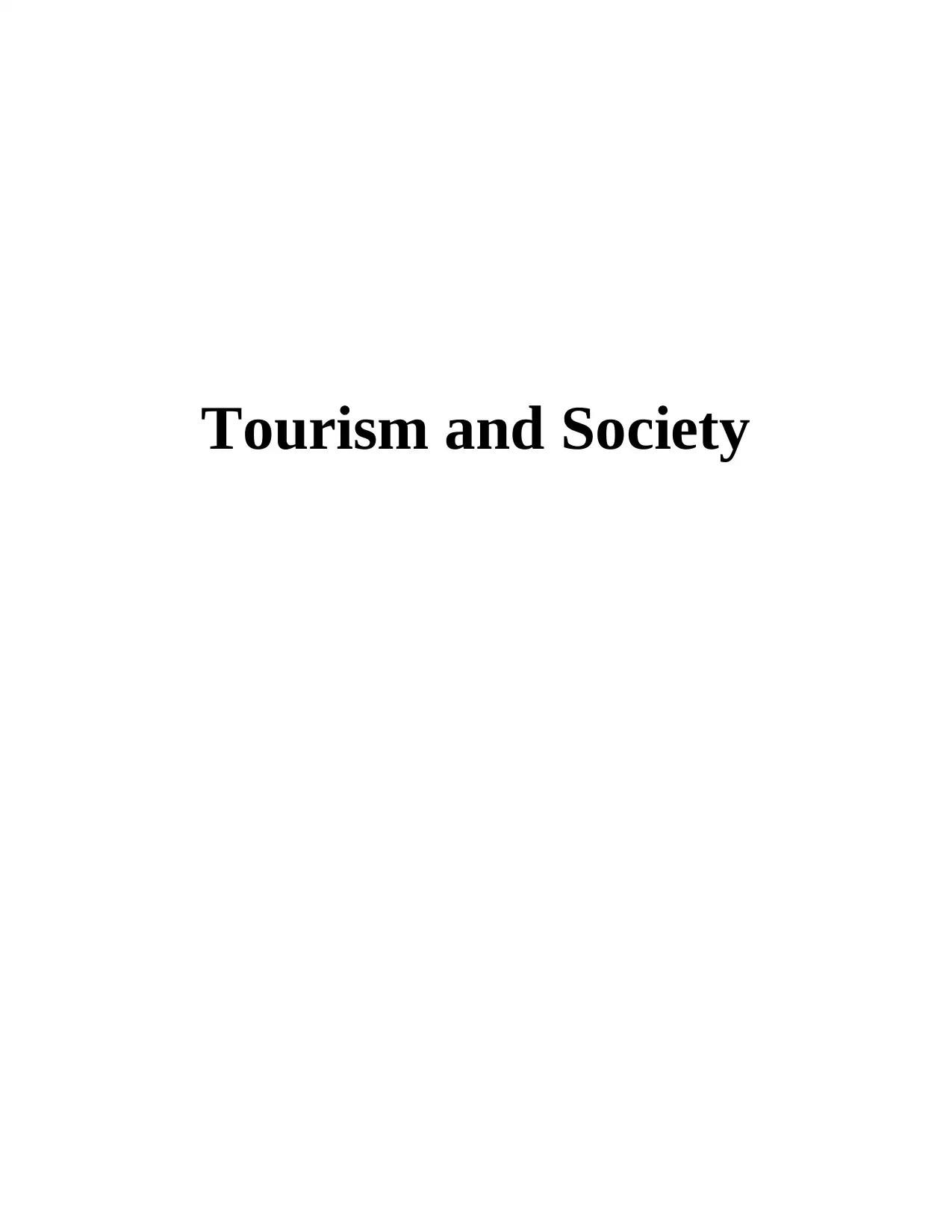
Tourism and Society
Paraphrase This Document
Need a fresh take? Get an instant paraphrase of this document with our AI Paraphraser
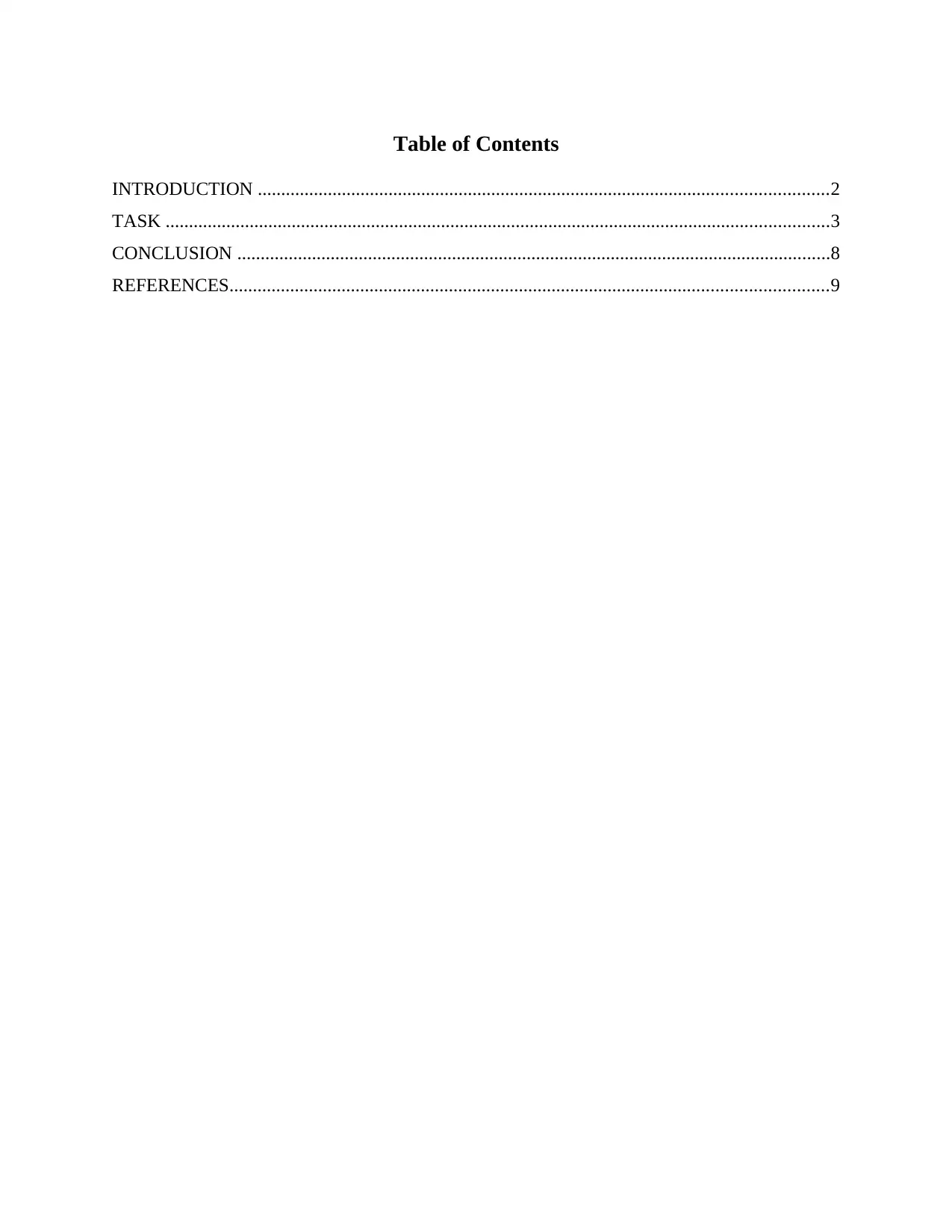
Table of Contents
INTRODUCTION ..........................................................................................................................2
TASK ..............................................................................................................................................3
CONCLUSION ...............................................................................................................................8
REFERENCES................................................................................................................................9
INTRODUCTION ..........................................................................................................................2
TASK ..............................................................................................................................................3
CONCLUSION ...............................................................................................................................8
REFERENCES................................................................................................................................9

INTRODUCTION
When viewing the economic perspective, tourism is the source of the wealth and jobs. But the
reality is that wealth arises from the society and the employment opportunity are not that
available. Comparing other side that is socio cultural perspective, tourism is the source that bring
people from different background and culture together and foster peace. Thus tourism is one of
the crucial aspect of the global economy. It is also the major source of revenue. There exist a
relationship between the tourism and society which includes the communication of people that
belongs to different nation and therefore assist in developing peaceful relations. Opportunities
are provided by the tourism on big scale to people around world that also aids people from
weaker section that includes minorities, youth and women(Ceylan, Çizel and Karakaş, 2021). At
present, the revenue generated from the tourism industry is the major source so revenue fro any
country and thus for the welfare and development of the society. It has been observed that
tourism enhances the revenue of the economy, create employment opportunities on large scale,
improves the infrastructure of a country and also creates a bond between foreigner and citizens.
Various benefits are provided by the tourism socially like preserving the culture for the
upcoming generations, making the communities more stronger, commercialising the culture and
art and also preserving the heritage. Sociology with respect to tourism is an emergency
speciality which is related to the study of the touristic motivations, roles, relationships and
institutions and of their impact on the tourist and also on the societies. The sociology have an
active part in the tourism as it brings the understanding of the society that includes the
knowledge which specifies the attractions in a destination that promotes the tourist to visit a
particular place.
TASK
Tourism and society refers to an area where the individual from across tourism in order to
discuss, debate, for sharing the views and knowledge and also to make the networks. For the
countries which is still at the stage of development, considers tourism as the source of
development for the country and also the base for improving the quality of life. The way tourist
behave have a major impact on the UK.
In UK, the contribution made by the tourism is EURO 106billion to the British economy and to
the GDP and supports around 2.6 million jobs. It has been estimated by the tourism industry that
When viewing the economic perspective, tourism is the source of the wealth and jobs. But the
reality is that wealth arises from the society and the employment opportunity are not that
available. Comparing other side that is socio cultural perspective, tourism is the source that bring
people from different background and culture together and foster peace. Thus tourism is one of
the crucial aspect of the global economy. It is also the major source of revenue. There exist a
relationship between the tourism and society which includes the communication of people that
belongs to different nation and therefore assist in developing peaceful relations. Opportunities
are provided by the tourism on big scale to people around world that also aids people from
weaker section that includes minorities, youth and women(Ceylan, Çizel and Karakaş, 2021). At
present, the revenue generated from the tourism industry is the major source so revenue fro any
country and thus for the welfare and development of the society. It has been observed that
tourism enhances the revenue of the economy, create employment opportunities on large scale,
improves the infrastructure of a country and also creates a bond between foreigner and citizens.
Various benefits are provided by the tourism socially like preserving the culture for the
upcoming generations, making the communities more stronger, commercialising the culture and
art and also preserving the heritage. Sociology with respect to tourism is an emergency
speciality which is related to the study of the touristic motivations, roles, relationships and
institutions and of their impact on the tourist and also on the societies. The sociology have an
active part in the tourism as it brings the understanding of the society that includes the
knowledge which specifies the attractions in a destination that promotes the tourist to visit a
particular place.
TASK
Tourism and society refers to an area where the individual from across tourism in order to
discuss, debate, for sharing the views and knowledge and also to make the networks. For the
countries which is still at the stage of development, considers tourism as the source of
development for the country and also the base for improving the quality of life. The way tourist
behave have a major impact on the UK.
In UK, the contribution made by the tourism is EURO 106billion to the British economy and to
the GDP and supports around 2.6 million jobs. It has been estimated by the tourism industry that
⊘ This is a preview!⊘
Do you want full access?
Subscribe today to unlock all pages.

Trusted by 1+ million students worldwide
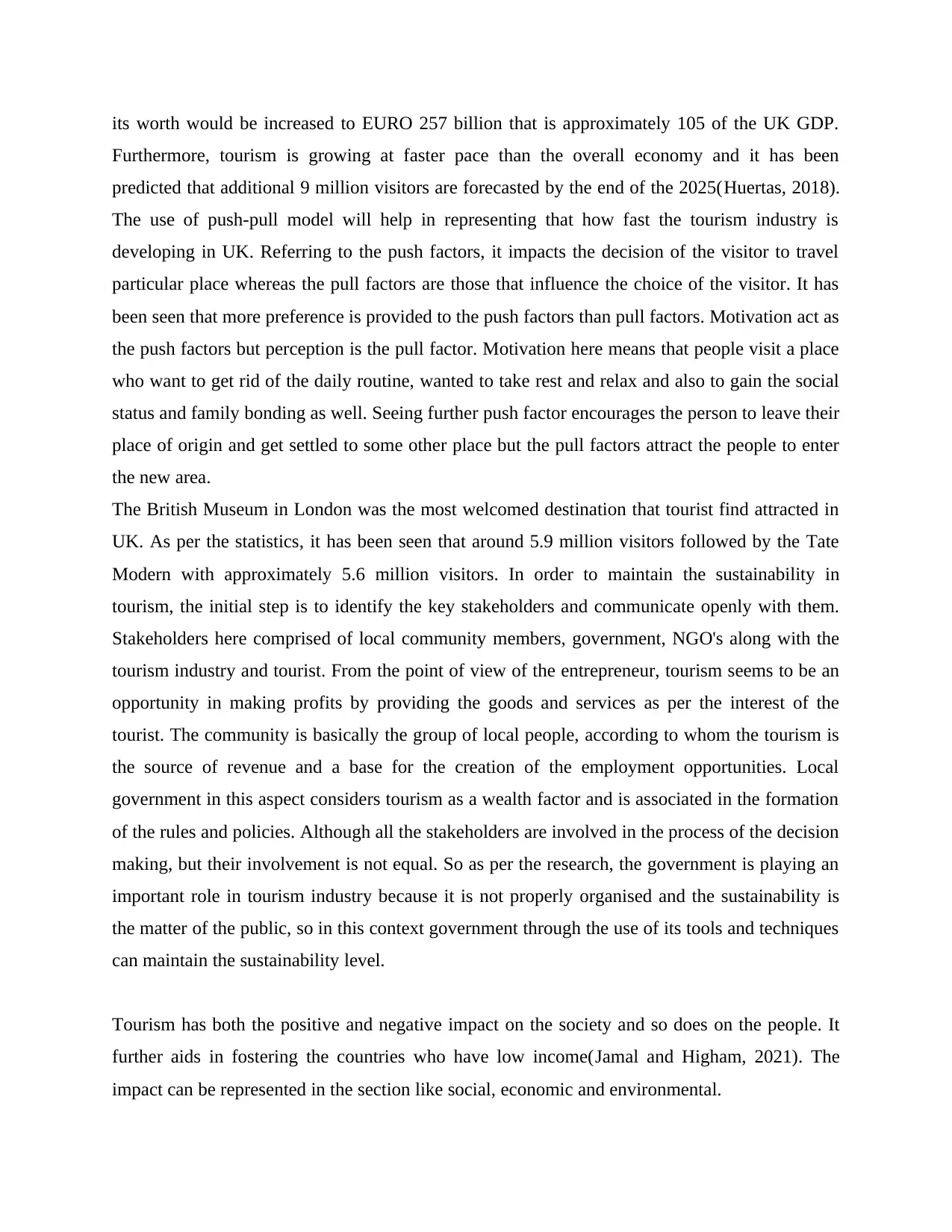
its worth would be increased to EURO 257 billion that is approximately 105 of the UK GDP.
Furthermore, tourism is growing at faster pace than the overall economy and it has been
predicted that additional 9 million visitors are forecasted by the end of the 2025(Huertas, 2018).
The use of push-pull model will help in representing that how fast the tourism industry is
developing in UK. Referring to the push factors, it impacts the decision of the visitor to travel
particular place whereas the pull factors are those that influence the choice of the visitor. It has
been seen that more preference is provided to the push factors than pull factors. Motivation act as
the push factors but perception is the pull factor. Motivation here means that people visit a place
who want to get rid of the daily routine, wanted to take rest and relax and also to gain the social
status and family bonding as well. Seeing further push factor encourages the person to leave their
place of origin and get settled to some other place but the pull factors attract the people to enter
the new area.
The British Museum in London was the most welcomed destination that tourist find attracted in
UK. As per the statistics, it has been seen that around 5.9 million visitors followed by the Tate
Modern with approximately 5.6 million visitors. In order to maintain the sustainability in
tourism, the initial step is to identify the key stakeholders and communicate openly with them.
Stakeholders here comprised of local community members, government, NGO's along with the
tourism industry and tourist. From the point of view of the entrepreneur, tourism seems to be an
opportunity in making profits by providing the goods and services as per the interest of the
tourist. The community is basically the group of local people, according to whom the tourism is
the source of revenue and a base for the creation of the employment opportunities. Local
government in this aspect considers tourism as a wealth factor and is associated in the formation
of the rules and policies. Although all the stakeholders are involved in the process of the decision
making, but their involvement is not equal. So as per the research, the government is playing an
important role in tourism industry because it is not properly organised and the sustainability is
the matter of the public, so in this context government through the use of its tools and techniques
can maintain the sustainability level.
Tourism has both the positive and negative impact on the society and so does on the people. It
further aids in fostering the countries who have low income(Jamal and Higham, 2021). The
impact can be represented in the section like social, economic and environmental.
Furthermore, tourism is growing at faster pace than the overall economy and it has been
predicted that additional 9 million visitors are forecasted by the end of the 2025(Huertas, 2018).
The use of push-pull model will help in representing that how fast the tourism industry is
developing in UK. Referring to the push factors, it impacts the decision of the visitor to travel
particular place whereas the pull factors are those that influence the choice of the visitor. It has
been seen that more preference is provided to the push factors than pull factors. Motivation act as
the push factors but perception is the pull factor. Motivation here means that people visit a place
who want to get rid of the daily routine, wanted to take rest and relax and also to gain the social
status and family bonding as well. Seeing further push factor encourages the person to leave their
place of origin and get settled to some other place but the pull factors attract the people to enter
the new area.
The British Museum in London was the most welcomed destination that tourist find attracted in
UK. As per the statistics, it has been seen that around 5.9 million visitors followed by the Tate
Modern with approximately 5.6 million visitors. In order to maintain the sustainability in
tourism, the initial step is to identify the key stakeholders and communicate openly with them.
Stakeholders here comprised of local community members, government, NGO's along with the
tourism industry and tourist. From the point of view of the entrepreneur, tourism seems to be an
opportunity in making profits by providing the goods and services as per the interest of the
tourist. The community is basically the group of local people, according to whom the tourism is
the source of revenue and a base for the creation of the employment opportunities. Local
government in this aspect considers tourism as a wealth factor and is associated in the formation
of the rules and policies. Although all the stakeholders are involved in the process of the decision
making, but their involvement is not equal. So as per the research, the government is playing an
important role in tourism industry because it is not properly organised and the sustainability is
the matter of the public, so in this context government through the use of its tools and techniques
can maintain the sustainability level.
Tourism has both the positive and negative impact on the society and so does on the people. It
further aids in fostering the countries who have low income(Jamal and Higham, 2021). The
impact can be represented in the section like social, economic and environmental.
Paraphrase This Document
Need a fresh take? Get an instant paraphrase of this document with our AI Paraphraser
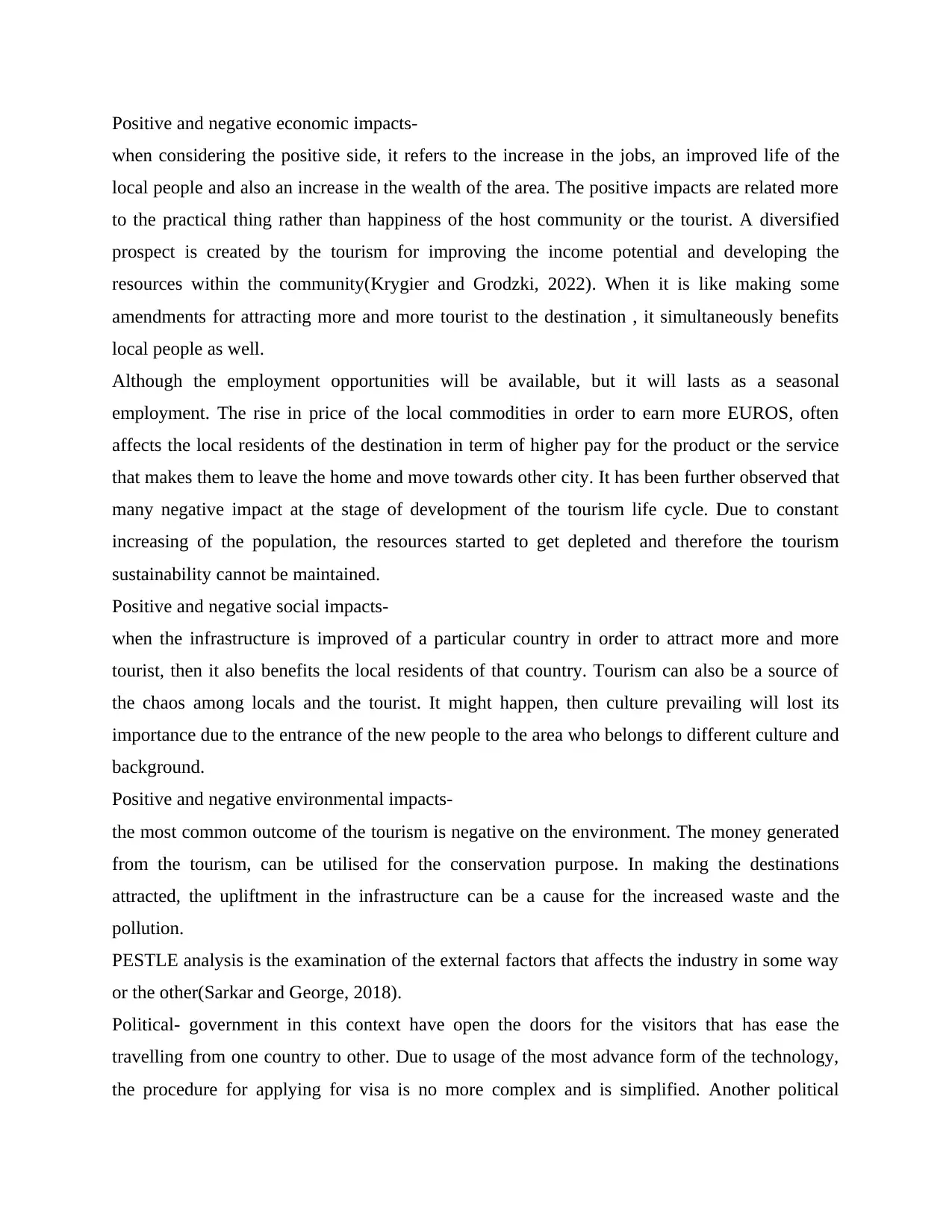
Positive and negative economic impacts-
when considering the positive side, it refers to the increase in the jobs, an improved life of the
local people and also an increase in the wealth of the area. The positive impacts are related more
to the practical thing rather than happiness of the host community or the tourist. A diversified
prospect is created by the tourism for improving the income potential and developing the
resources within the community(Krygier and Grodzki, 2022). When it is like making some
amendments for attracting more and more tourist to the destination , it simultaneously benefits
local people as well.
Although the employment opportunities will be available, but it will lasts as a seasonal
employment. The rise in price of the local commodities in order to earn more EUROS, often
affects the local residents of the destination in term of higher pay for the product or the service
that makes them to leave the home and move towards other city. It has been further observed that
many negative impact at the stage of development of the tourism life cycle. Due to constant
increasing of the population, the resources started to get depleted and therefore the tourism
sustainability cannot be maintained.
Positive and negative social impacts-
when the infrastructure is improved of a particular country in order to attract more and more
tourist, then it also benefits the local residents of that country. Tourism can also be a source of
the chaos among locals and the tourist. It might happen, then culture prevailing will lost its
importance due to the entrance of the new people to the area who belongs to different culture and
background.
Positive and negative environmental impacts-
the most common outcome of the tourism is negative on the environment. The money generated
from the tourism, can be utilised for the conservation purpose. In making the destinations
attracted, the upliftment in the infrastructure can be a cause for the increased waste and the
pollution.
PESTLE analysis is the examination of the external factors that affects the industry in some way
or the other(Sarkar and George, 2018).
Political- government in this context have open the doors for the visitors that has ease the
travelling from one country to other. Due to usage of the most advance form of the technology,
the procedure for applying for visa is no more complex and is simplified. Another political
when considering the positive side, it refers to the increase in the jobs, an improved life of the
local people and also an increase in the wealth of the area. The positive impacts are related more
to the practical thing rather than happiness of the host community or the tourist. A diversified
prospect is created by the tourism for improving the income potential and developing the
resources within the community(Krygier and Grodzki, 2022). When it is like making some
amendments for attracting more and more tourist to the destination , it simultaneously benefits
local people as well.
Although the employment opportunities will be available, but it will lasts as a seasonal
employment. The rise in price of the local commodities in order to earn more EUROS, often
affects the local residents of the destination in term of higher pay for the product or the service
that makes them to leave the home and move towards other city. It has been further observed that
many negative impact at the stage of development of the tourism life cycle. Due to constant
increasing of the population, the resources started to get depleted and therefore the tourism
sustainability cannot be maintained.
Positive and negative social impacts-
when the infrastructure is improved of a particular country in order to attract more and more
tourist, then it also benefits the local residents of that country. Tourism can also be a source of
the chaos among locals and the tourist. It might happen, then culture prevailing will lost its
importance due to the entrance of the new people to the area who belongs to different culture and
background.
Positive and negative environmental impacts-
the most common outcome of the tourism is negative on the environment. The money generated
from the tourism, can be utilised for the conservation purpose. In making the destinations
attracted, the upliftment in the infrastructure can be a cause for the increased waste and the
pollution.
PESTLE analysis is the examination of the external factors that affects the industry in some way
or the other(Sarkar and George, 2018).
Political- government in this context have open the doors for the visitors that has ease the
travelling from one country to other. Due to usage of the most advance form of the technology,
the procedure for applying for visa is no more complex and is simplified. Another political
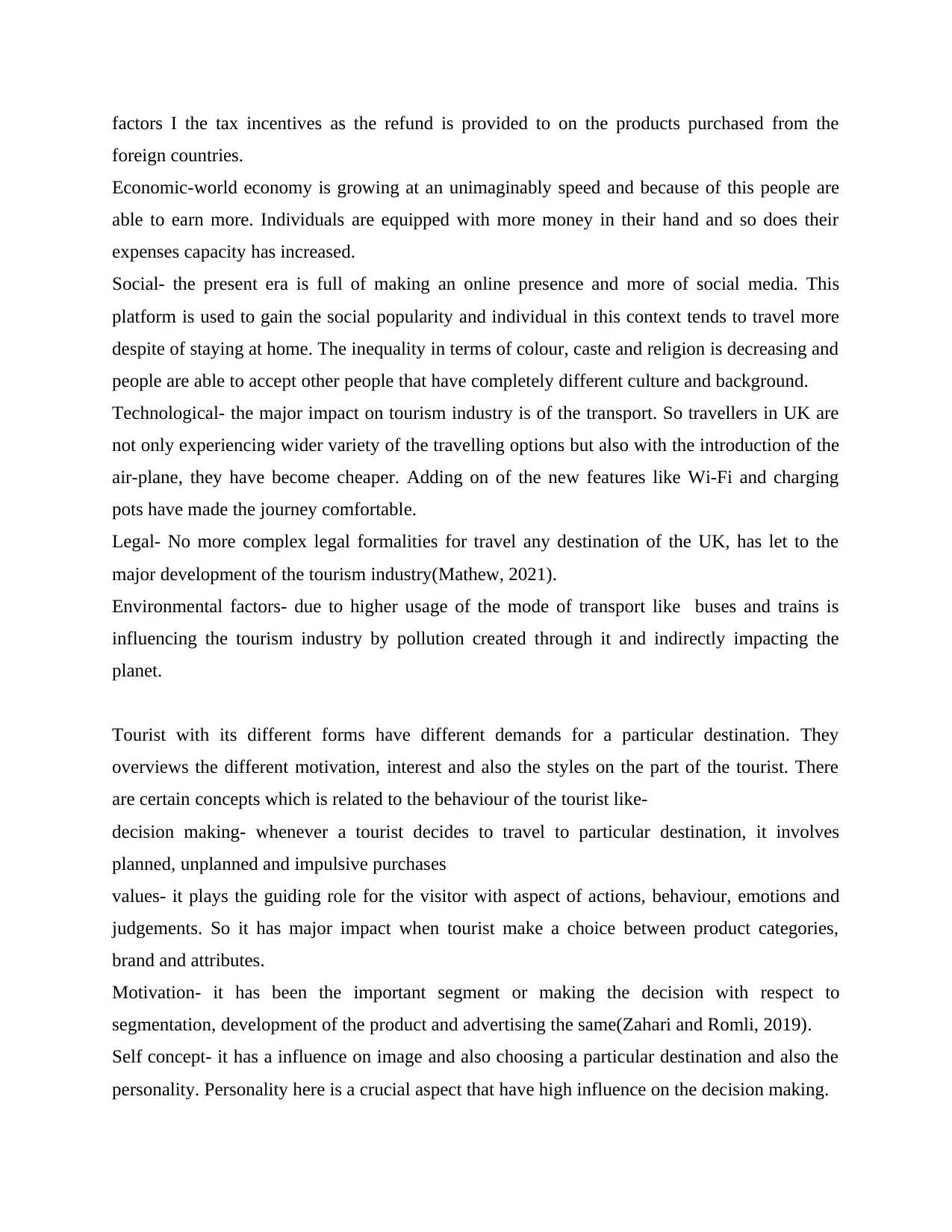
factors I the tax incentives as the refund is provided to on the products purchased from the
foreign countries.
Economic-world economy is growing at an unimaginably speed and because of this people are
able to earn more. Individuals are equipped with more money in their hand and so does their
expenses capacity has increased.
Social- the present era is full of making an online presence and more of social media. This
platform is used to gain the social popularity and individual in this context tends to travel more
despite of staying at home. The inequality in terms of colour, caste and religion is decreasing and
people are able to accept other people that have completely different culture and background.
Technological- the major impact on tourism industry is of the transport. So travellers in UK are
not only experiencing wider variety of the travelling options but also with the introduction of the
air-plane, they have become cheaper. Adding on of the new features like Wi-Fi and charging
pots have made the journey comfortable.
Legal- No more complex legal formalities for travel any destination of the UK, has let to the
major development of the tourism industry(Mathew, 2021).
Environmental factors- due to higher usage of the mode of transport like buses and trains is
influencing the tourism industry by pollution created through it and indirectly impacting the
planet.
Tourist with its different forms have different demands for a particular destination. They
overviews the different motivation, interest and also the styles on the part of the tourist. There
are certain concepts which is related to the behaviour of the tourist like-
decision making- whenever a tourist decides to travel to particular destination, it involves
planned, unplanned and impulsive purchases
values- it plays the guiding role for the visitor with aspect of actions, behaviour, emotions and
judgements. So it has major impact when tourist make a choice between product categories,
brand and attributes.
Motivation- it has been the important segment or making the decision with respect to
segmentation, development of the product and advertising the same(Zahari and Romli, 2019).
Self concept- it has a influence on image and also choosing a particular destination and also the
personality. Personality here is a crucial aspect that have high influence on the decision making.
foreign countries.
Economic-world economy is growing at an unimaginably speed and because of this people are
able to earn more. Individuals are equipped with more money in their hand and so does their
expenses capacity has increased.
Social- the present era is full of making an online presence and more of social media. This
platform is used to gain the social popularity and individual in this context tends to travel more
despite of staying at home. The inequality in terms of colour, caste and religion is decreasing and
people are able to accept other people that have completely different culture and background.
Technological- the major impact on tourism industry is of the transport. So travellers in UK are
not only experiencing wider variety of the travelling options but also with the introduction of the
air-plane, they have become cheaper. Adding on of the new features like Wi-Fi and charging
pots have made the journey comfortable.
Legal- No more complex legal formalities for travel any destination of the UK, has let to the
major development of the tourism industry(Mathew, 2021).
Environmental factors- due to higher usage of the mode of transport like buses and trains is
influencing the tourism industry by pollution created through it and indirectly impacting the
planet.
Tourist with its different forms have different demands for a particular destination. They
overviews the different motivation, interest and also the styles on the part of the tourist. There
are certain concepts which is related to the behaviour of the tourist like-
decision making- whenever a tourist decides to travel to particular destination, it involves
planned, unplanned and impulsive purchases
values- it plays the guiding role for the visitor with aspect of actions, behaviour, emotions and
judgements. So it has major impact when tourist make a choice between product categories,
brand and attributes.
Motivation- it has been the important segment or making the decision with respect to
segmentation, development of the product and advertising the same(Zahari and Romli, 2019).
Self concept- it has a influence on image and also choosing a particular destination and also the
personality. Personality here is a crucial aspect that have high influence on the decision making.
⊘ This is a preview!⊘
Do you want full access?
Subscribe today to unlock all pages.

Trusted by 1+ million students worldwide
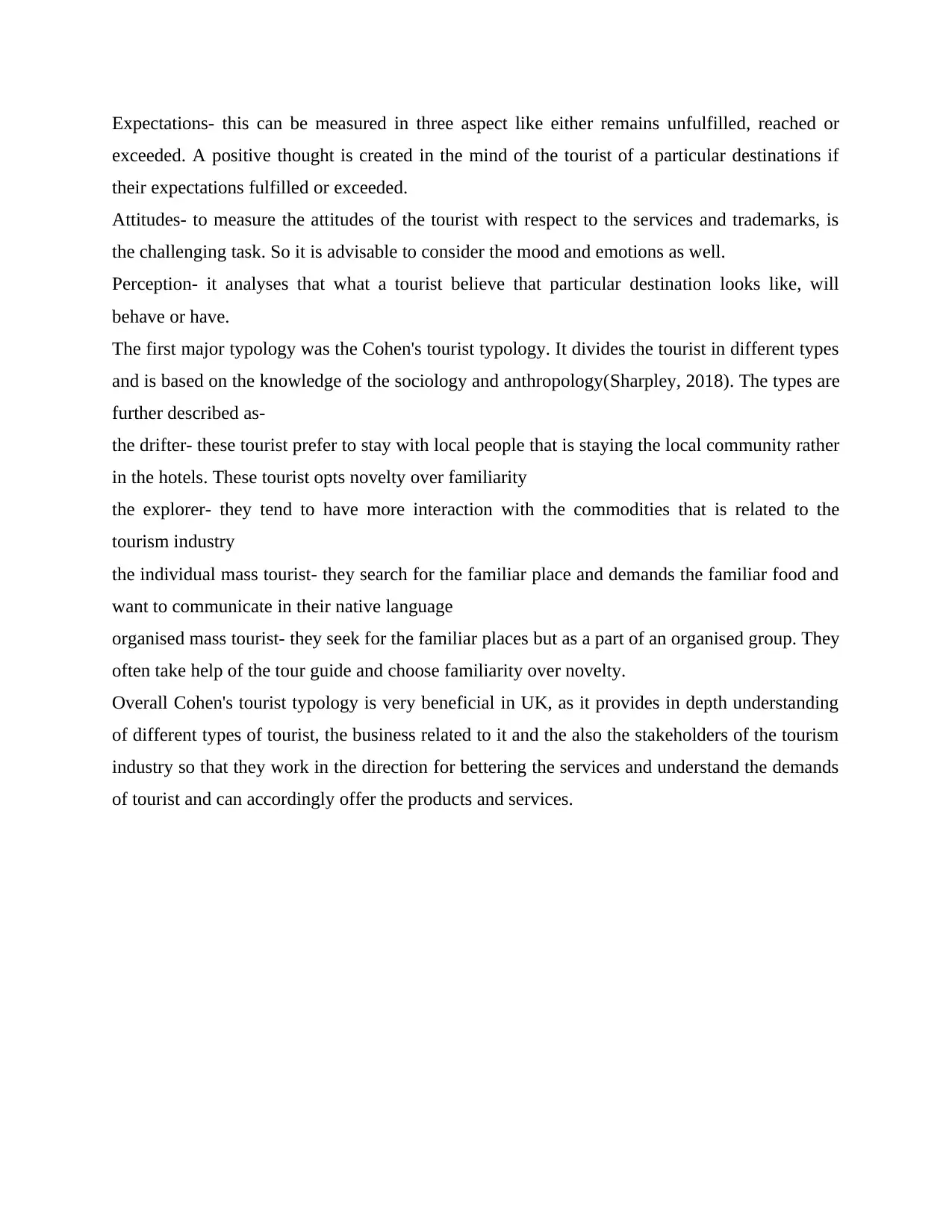
Expectations- this can be measured in three aspect like either remains unfulfilled, reached or
exceeded. A positive thought is created in the mind of the tourist of a particular destinations if
their expectations fulfilled or exceeded.
Attitudes- to measure the attitudes of the tourist with respect to the services and trademarks, is
the challenging task. So it is advisable to consider the mood and emotions as well.
Perception- it analyses that what a tourist believe that particular destination looks like, will
behave or have.
The first major typology was the Cohen's tourist typology. It divides the tourist in different types
and is based on the knowledge of the sociology and anthropology(Sharpley, 2018). The types are
further described as-
the drifter- these tourist prefer to stay with local people that is staying the local community rather
in the hotels. These tourist opts novelty over familiarity
the explorer- they tend to have more interaction with the commodities that is related to the
tourism industry
the individual mass tourist- they search for the familiar place and demands the familiar food and
want to communicate in their native language
organised mass tourist- they seek for the familiar places but as a part of an organised group. They
often take help of the tour guide and choose familiarity over novelty.
Overall Cohen's tourist typology is very beneficial in UK, as it provides in depth understanding
of different types of tourist, the business related to it and the also the stakeholders of the tourism
industry so that they work in the direction for bettering the services and understand the demands
of tourist and can accordingly offer the products and services.
exceeded. A positive thought is created in the mind of the tourist of a particular destinations if
their expectations fulfilled or exceeded.
Attitudes- to measure the attitudes of the tourist with respect to the services and trademarks, is
the challenging task. So it is advisable to consider the mood and emotions as well.
Perception- it analyses that what a tourist believe that particular destination looks like, will
behave or have.
The first major typology was the Cohen's tourist typology. It divides the tourist in different types
and is based on the knowledge of the sociology and anthropology(Sharpley, 2018). The types are
further described as-
the drifter- these tourist prefer to stay with local people that is staying the local community rather
in the hotels. These tourist opts novelty over familiarity
the explorer- they tend to have more interaction with the commodities that is related to the
tourism industry
the individual mass tourist- they search for the familiar place and demands the familiar food and
want to communicate in their native language
organised mass tourist- they seek for the familiar places but as a part of an organised group. They
often take help of the tour guide and choose familiarity over novelty.
Overall Cohen's tourist typology is very beneficial in UK, as it provides in depth understanding
of different types of tourist, the business related to it and the also the stakeholders of the tourism
industry so that they work in the direction for bettering the services and understand the demands
of tourist and can accordingly offer the products and services.
Paraphrase This Document
Need a fresh take? Get an instant paraphrase of this document with our AI Paraphraser
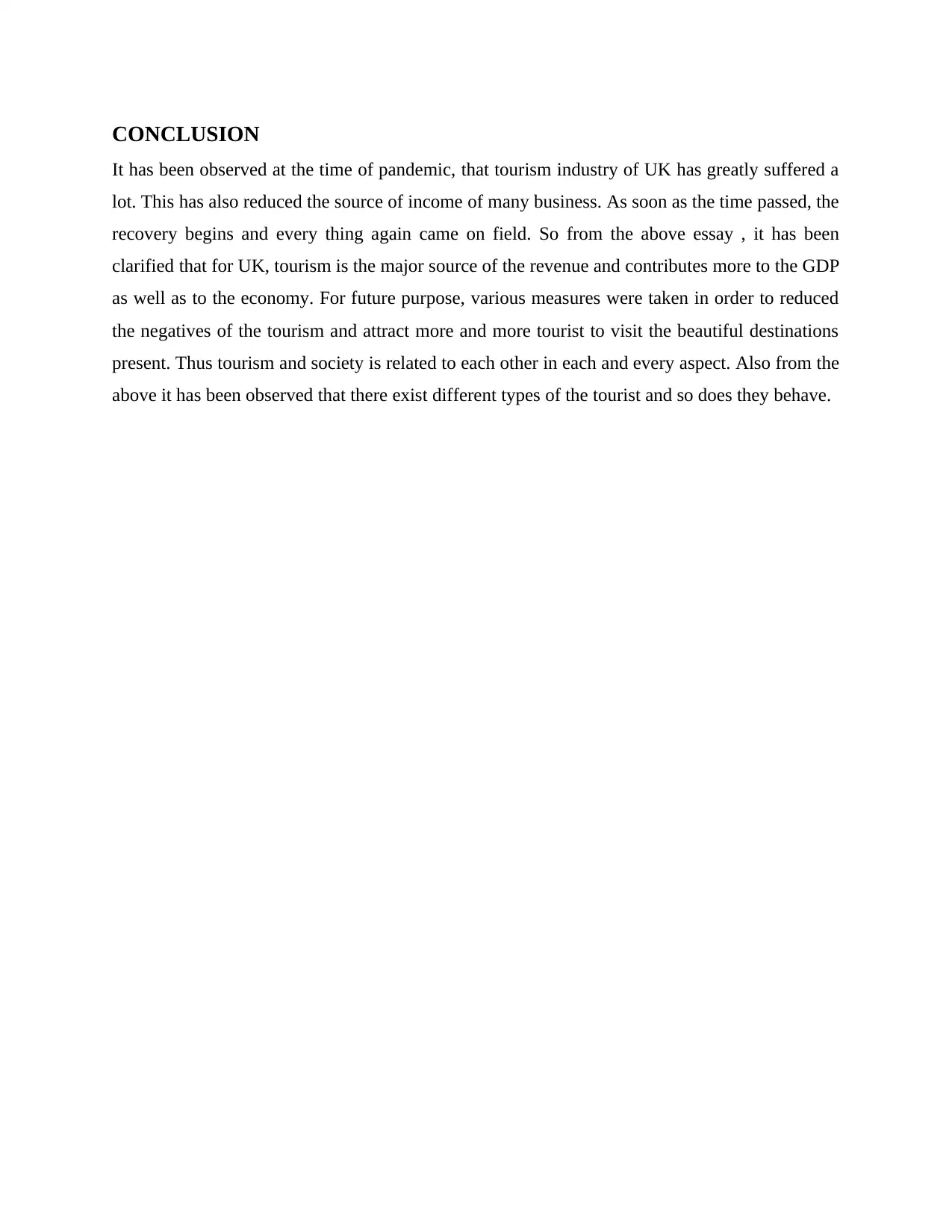
CONCLUSION
It has been observed at the time of pandemic, that tourism industry of UK has greatly suffered a
lot. This has also reduced the source of income of many business. As soon as the time passed, the
recovery begins and every thing again came on field. So from the above essay , it has been
clarified that for UK, tourism is the major source of the revenue and contributes more to the GDP
as well as to the economy. For future purpose, various measures were taken in order to reduced
the negatives of the tourism and attract more and more tourist to visit the beautiful destinations
present. Thus tourism and society is related to each other in each and every aspect. Also from the
above it has been observed that there exist different types of the tourist and so does they behave.
It has been observed at the time of pandemic, that tourism industry of UK has greatly suffered a
lot. This has also reduced the source of income of many business. As soon as the time passed, the
recovery begins and every thing again came on field. So from the above essay , it has been
clarified that for UK, tourism is the major source of the revenue and contributes more to the GDP
as well as to the economy. For future purpose, various measures were taken in order to reduced
the negatives of the tourism and attract more and more tourist to visit the beautiful destinations
present. Thus tourism and society is related to each other in each and every aspect. Also from the
above it has been observed that there exist different types of the tourist and so does they behave.
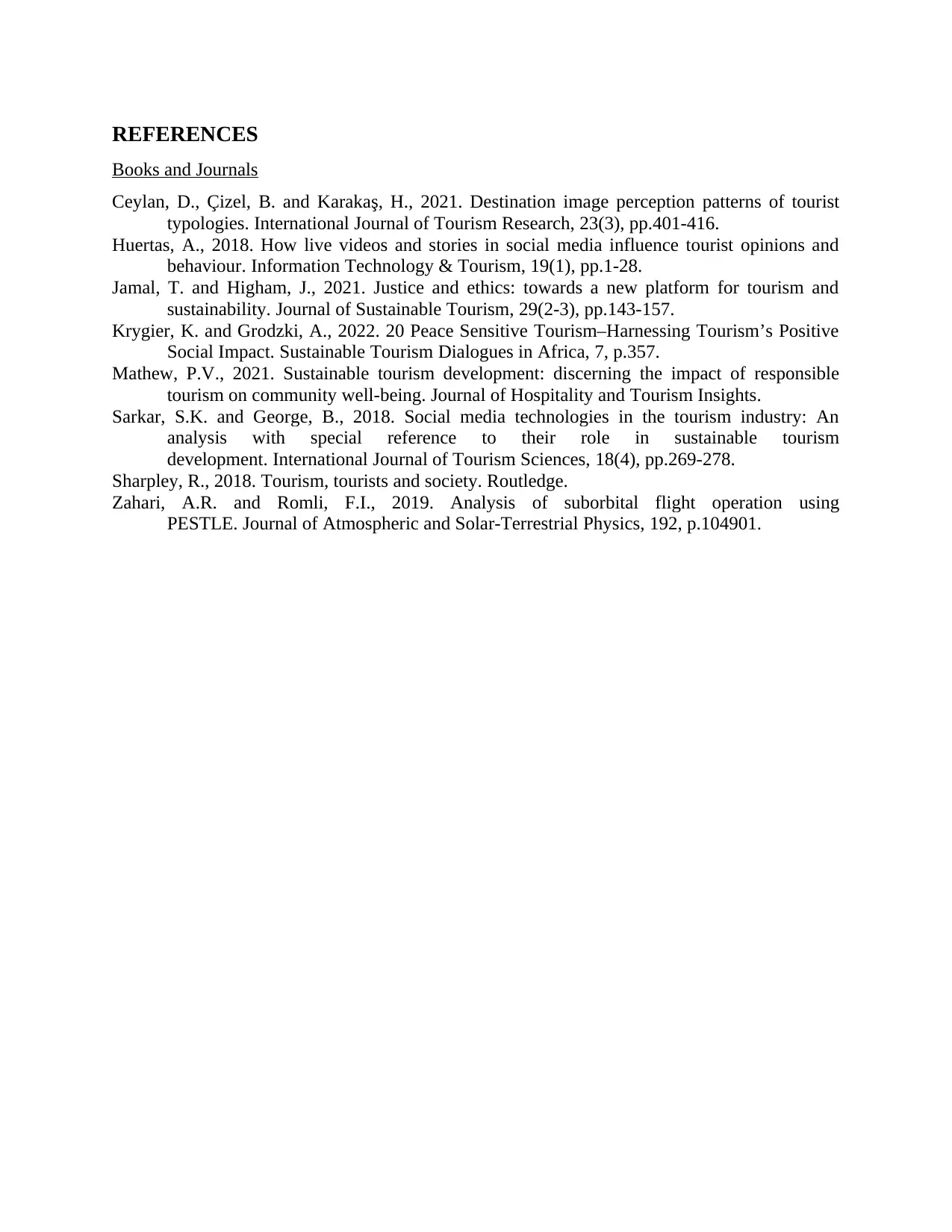
REFERENCES
Books and Journals
Ceylan, D., Çizel, B. and Karakaş, H., 2021. Destination image perception patterns of tourist
typologies. International Journal of Tourism Research, 23(3), pp.401-416.
Huertas, A., 2018. How live videos and stories in social media influence tourist opinions and
behaviour. Information Technology & Tourism, 19(1), pp.1-28.
Jamal, T. and Higham, J., 2021. Justice and ethics: towards a new platform for tourism and
sustainability. Journal of Sustainable Tourism, 29(2-3), pp.143-157.
Krygier, K. and Grodzki, A., 2022. 20 Peace Sensitive Tourism–Harnessing Tourism’s Positive
Social Impact. Sustainable Tourism Dialogues in Africa, 7, p.357.
Mathew, P.V., 2021. Sustainable tourism development: discerning the impact of responsible
tourism on community well-being. Journal of Hospitality and Tourism Insights.
Sarkar, S.K. and George, B., 2018. Social media technologies in the tourism industry: An
analysis with special reference to their role in sustainable tourism
development. International Journal of Tourism Sciences, 18(4), pp.269-278.
Sharpley, R., 2018. Tourism, tourists and society. Routledge.
Zahari, A.R. and Romli, F.I., 2019. Analysis of suborbital flight operation using
PESTLE. Journal of Atmospheric and Solar-Terrestrial Physics, 192, p.104901.
Books and Journals
Ceylan, D., Çizel, B. and Karakaş, H., 2021. Destination image perception patterns of tourist
typologies. International Journal of Tourism Research, 23(3), pp.401-416.
Huertas, A., 2018. How live videos and stories in social media influence tourist opinions and
behaviour. Information Technology & Tourism, 19(1), pp.1-28.
Jamal, T. and Higham, J., 2021. Justice and ethics: towards a new platform for tourism and
sustainability. Journal of Sustainable Tourism, 29(2-3), pp.143-157.
Krygier, K. and Grodzki, A., 2022. 20 Peace Sensitive Tourism–Harnessing Tourism’s Positive
Social Impact. Sustainable Tourism Dialogues in Africa, 7, p.357.
Mathew, P.V., 2021. Sustainable tourism development: discerning the impact of responsible
tourism on community well-being. Journal of Hospitality and Tourism Insights.
Sarkar, S.K. and George, B., 2018. Social media technologies in the tourism industry: An
analysis with special reference to their role in sustainable tourism
development. International Journal of Tourism Sciences, 18(4), pp.269-278.
Sharpley, R., 2018. Tourism, tourists and society. Routledge.
Zahari, A.R. and Romli, F.I., 2019. Analysis of suborbital flight operation using
PESTLE. Journal of Atmospheric and Solar-Terrestrial Physics, 192, p.104901.
⊘ This is a preview!⊘
Do you want full access?
Subscribe today to unlock all pages.

Trusted by 1+ million students worldwide
1 out of 9
Related Documents
Your All-in-One AI-Powered Toolkit for Academic Success.
+13062052269
info@desklib.com
Available 24*7 on WhatsApp / Email
![[object Object]](/_next/static/media/star-bottom.7253800d.svg)
Unlock your academic potential
Copyright © 2020–2026 A2Z Services. All Rights Reserved. Developed and managed by ZUCOL.





